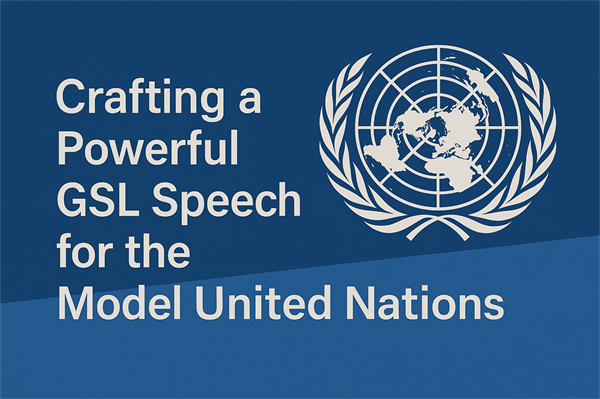Skills You Gain from Model United Nations
- Get link
- X
- Other Apps
Model United Nations (MUN) is more than just a simulation of the United Nations—it is a platform that shapes young minds into future leaders, diplomats, and global citizens. By stepping into the shoes of world leaders and tackling pressing international issues, participants develop a wide range of skills that extend far beyond the conference room. These skills are not only valuable for academic growth but also essential for professional success and personal development.
In this blog, we will explore the key skills gained from participating in MUN and how they prepare students to thrive in today’s interconnected world.
1. Public Speaking and Communication
One of the most prominent skills that MUN nurtures is public speaking. Standing in front of a committee and addressing delegates requires confidence, clarity, and conviction. MUN pushes participants to articulate their ideas persuasively while remaining respectful of differing opinions.
Through repeated practice, delegates learn how to:
-
Structure their arguments clearly.
-
Use formal diplomatic language.
-
Adapt their tone to suit different audiences.
These communication skills are transferable to classrooms, job interviews, workplace presentations, and any situation that demands confident expression.
2. Research and Critical Thinking
MUN is built on preparation. To represent a country effectively, participants must conduct thorough research about its policies, history, and stance on global issues. This involves reading international reports, analyzing policy documents, and understanding the political and cultural background of the assigned nation.
This process sharpens research abilities and teaches students how to evaluate credible sources. Moreover, as debates unfold, critical thinking comes into play. Delegates must analyze complex problems, identify solutions, and weigh the consequences of their proposals. This practice of thinking logically and strategically builds an analytical mindset that proves useful in academics and professional problem-solving.
3. Negotiation and Diplomacy
At its core, MUN is about diplomacy. Delegates must find common ground with countries holding diverse viewpoints. This requires patience, negotiation, and compromise. Unlike traditional debates, where winning an argument is the goal, MUN emphasizes collaboration and consensus-building.
Through negotiations, participants learn how to:
-
Defend their country’s stance without alienating others.
-
Draft resolutions that incorporate multiple perspectives.
-
Build alliances and form blocs strategically.
These diplomatic skills are invaluable in real-world scenarios, from managing workplace conflicts to navigating international relations.
4. Teamwork and Collaboration
Although delegates represent individual nations, progress at MUN is often made through teamwork. Drafting resolutions, lobbying, and strategizing demand collaboration with other participants. Delegates must share ideas, divide responsibilities, and work toward common goals.
This fosters teamwork and highlights the importance of collective problem-solving. It also enhances interpersonal skills, teaching participants how to listen actively, respect diverse opinions, and value each member’s contribution. These lessons in collaboration are particularly relevant for careers that demand group projects or cross-cultural teamwork.
5. Leadership and Initiative
MUN provides countless opportunities to demonstrate leadership. Whether leading a bloc discussion, drafting a resolution, or mediating conflicts between opposing groups, delegates are constantly encouraged to take initiative.
Leadership in MUN is not about dominating the conversation—it is about guiding discussions, ensuring inclusivity, and inspiring others to contribute. Students develop confidence in their ability to lead responsibly, a skill that translates into academic leadership roles, workplace management, and community engagement.
6. Writing and Documentation
MUN involves drafting position papers, working papers, and resolutions. These documents require formal, concise, and persuasive writing. Delegates learn how to structure arguments in writing, use diplomatic terminology, and present solutions in a format aligned with UN standards.
This practice enhances academic writing, report preparation, and professional correspondence. It trains participants to express complex ideas in a clear and structured manner, which is an asset in both higher education and professional careers.
7. Cultural Awareness and Global Perspective
By representing countries other than their own, delegates gain exposure to different political, cultural, and social perspectives. This fosters cultural awareness and sensitivity. MUN broadens students’ horizons by teaching them to see issues through the lens of diverse nations and communities.
In today’s globalized world, this ability to appreciate cultural diversity and adopt a global perspective is crucial. It prepares students to work in multicultural environments and to address challenges that transcend national boundaries.
8. Confidence and Personal Growth
For many students, MUN is their first experience speaking in front of a large audience or negotiating with peers. Over time, as they become more comfortable, their confidence grows. They learn to handle challenges with composure, manage stress during debates, and remain adaptable in dynamic discussions.
This personal growth extends beyond MUN. The confidence gained empowers students in their academic pursuits, professional careers, and everyday interactions.
9. Time Management and Organization
Preparing for MUN requires balancing research, drafting position papers, and rehearsing speeches within limited time frames. During conferences, delegates must also manage their speaking time, participate in lobbying sessions, and coordinate with other delegates.
This experience teaches students to prioritize tasks, stay organized, and meet deadlines—skills that are essential in academics, careers, and personal life management.
Conclusion
Model United Nations is not just an academic activity—it is a transformative experience that equips students with lifelong skills. From public speaking and negotiation to leadership and cultural awareness, the skills gained at MUN prepare participants to become confident leaders, thoughtful problem-solvers, and responsible global citizens.
By engaging in MUN, students don’t just learn about international relations; they learn about themselves—their strengths, their potential, and their ability to make an impact on the world.
- Get link
- X
- Other Apps

Comments
Post a Comment